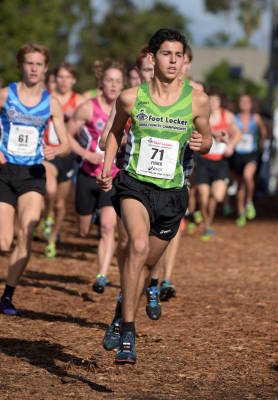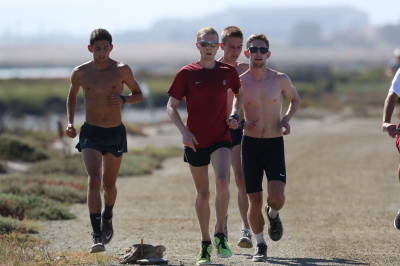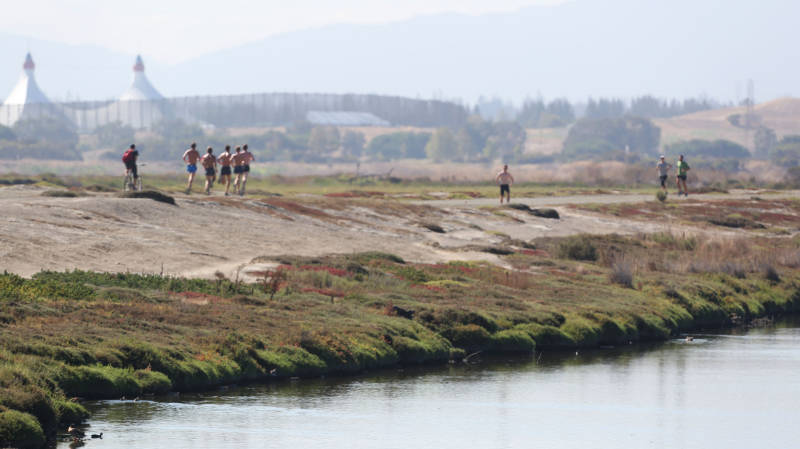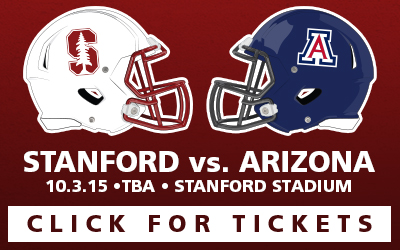Grant Fisher arrived at Stanford on August 27 with an accomplishment unprecedented in high school running – no one else has won two Foot Locker national cross country championships and run a sub-4 mile.
Now he’s just another freshman.
The No.2 Stanford men open Friday at the Fresno State Invitational, but Fisher is not likely to race, Coach Chris Miltenberg, Stanford’s Franklin P. Johnson Director of Track and Field, is bringing the Grand Blanc, Michigan, native along slowly as the freshman adjusts to the longer collegiate racing distances of 8K and 10K. He will be the only scholarship freshman competing for Stanford this year. Teammates Alex Ostberg and Will Lauer will redshirt.
The day before Fisher and the Cardinal left for 10 days of altitude training at Mammoth Lakes, Fisher talked about the next stage of his running career.
Q: Classes don’t start until Sept. 23, but you’re officially at college. What are your first impressions?
A: It’s starting to feel real. I was talking to the other freshmen about this -- we were focusing so much on getting to campus and being with the team that when it finally happened, it wasn’t real. It was like we were dreaming or something.
I really like the team and how they operate. I got a taste of that on my visit, but I didn’t really realize the inner workings of everything until now. We’ve had our first college workouts and they’ve been smooth. It’s been a good transition.
Q: Are the older guys helping that transition? 
A: The team is really tight-knit from what I’ve noticed. It’s a smaller group, which I like. The guys are showing us all the drills and all the routines that they do. We haven’t signed up for classes yet, so we we’re asking them questions about which ones were fun and which ones weren’t, and what’s a good progression of classes to take. It’s definitely appreciated.
Q: How have you prepared for the increase in race distances?
A: It’s going to be a challenge, 5K in high school to 10K in college is a big swing. My mileage has gone up a little bit each week, but there was never a point where I sat back and thought, Whoa, I’m doing so much mileage. It’s felt like a natural progression.
As I’ve gotten older and stronger, I’ve been capable of more miles, so the increases match that. As far as workouts go, they’re a little longer than I would do if I was prepping for a 5K, but that’s also expected. The workouts are longer and the miles are a tad bit more, but the team has a lot more recovery and prehab stuff than I was used to in high school. The training is more intense, but the effort to decrease injury and make sure you’re recovered is also pretty intense. It’s a good combo.
Q: Will you need to adjust to running twice a day?
A: I doubled a few times in high school. In an average week, I would double on Tuesdays. I’m doubling now and building up to more mileage. All summer, I was on a plan and gearing for the college stuff. It’s prepared me pretty well.
Q: Coach Miltenberg has said he doesn’t want you to race much this year. Are you good with that?
A: It would be very easy to get really excited and race a lot. But I think after my first race, I’m going to realize that the distance is longer, which means the recovery after the race is going to be longer.
I’m completely fine with being patient with it. I’m thinking long-term, which is one of the reasons I was attracted to coming to Stanford. Everything is long-term based and I think Coach Milt and I are on the same page.
Q: You received a lot of attention in high school, a lot having to do with your quest to run a sub-4 mile. How did you deal with it?
A: It was a little weird at times, but what worked best for me, and I figured this out eventually, was just to shut it all out at times. When I was younger, the attention wasn’t there. I could just go out and race. That was the mindset I tried to find as a senior. I couldn’t completely shut out all the distractions, but I did a good job of distancing myself from all the hype and everything everyone was saying. Just get down and train and race.
It’ll be fun in college, because I’m not nearly the fastest guy out there. It’ll be nice to be back at the bottom and climb my way back up. It’ll be fun to have faster guys to shoot for.
Q: What about Web sites or message boards?
A: There were times when it would be informative, but if you’re the athlete being talked about, it can get to your head. Everyone has their opinion about every point in the season – if you’re peaked or not, or burnt out or whatever. Just try to avoid it. I realized the only thing that really mattered to me were my coach and myself and my family.
Q: You don’t have to declare a major until the end of your sophomore year, but do you have any idea what academic field you may be interested in?
A: I’m really interested in management science and engineering. There are a few guys on the team that are majoring in that. Not 100 percent locked in by any means. Interested and I’ll take all the general courses leading up to it. That’s the main one I’m looking at right now.
Q: One of the draws of Stanford is that prominent athletes that have gone through here – like U.S. national team soccer player Jordan Morris or quarterback Andrew Luck – feel like they aren’t treated any differently. Was that something that appealed to you?
A: I really thought that was cool that the athletes aren’t separate from the student body or put on a pedestal. Everyone’s together. It’s not like you have the athletes in one college and the rest of the students in another.
Q: One of the great things about cross country is the team aspect. Have you gotten a sense of that here?
A: The team is incredibly strong and everyone realizes we have a shot to do something really special. Even though we have a number of top guys, we need everyone to perform on the same day to have a good result. That mentality brings out the best in everyone, because you’re not just running for yourself. The team has done everything together. We eat together, we train together, we’ve been hanging out together, playing cards and other stuff. It’s been fun.












